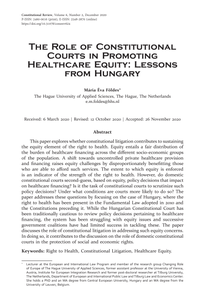This paper explores whether constitutional litigation contributes to sustaining the equity element of the right to health. Equity entails a fair distribution of the burden of healthcare financing across the different socio-economic groups of the population. A shift towards uncontrolled private healthcare provision and financing raises equity challenges by disproportionately benefitting those who are able to afford such services. The extent to which equity is enforced is an indicator of the strength of the right to health. However, do domestic constitutional courts second-guess, based on equity, policy decisions that impact on healthcare financing? Is it the task of constitutional courts to scrutinize such policy decisions? Under what conditions are courts more likely to do so? The paper addresses these questions by focusing on the case of Hungary, where the right to health has been present in the Fundamental Law adopted in 2010 and the Constitutions preceding it. While the Hungarian Constitutional Court has been traditionally cautious to review policy decisions pertaining to healthcare financing, the system has been struggling with equity issues and successive government coalitions have had limited success in tackling these. The paper discusses the role of constitutional litigation in addressing such equity concerns. In doing so, it contributes to the discussion on the role of domestic constitutional courts in the protection of social and economic rights.
MULTIFILE

Human rights groups are increasingly calling for the protection of their right to privacy in relation to the bulk surveillance and interception of their personal communications. Some are advocating through strategic litigation. This advocacy tool is often chosen when there is weak political or public support for an issue. Nonetheless, as a strategy it remains a question if a lawsuit is strategic in the context of establishing accountability for indiscriminate bulk data interception. The chapter concludes that from a legal perspective the effect of the decision to litigate on the basis of the claim that a collective right to group privacy was violated has not (yet) resulted in significant change. Yet the case study, the British case of human rights groups versus the intelligence agencies, does seem to suggest that they have been able to create more public awareness about mass surveillance and interception programs and its side-effects
LINK
In 'Ecodemocracy in the Wild: If existing democracies were to operationalize ecocentrism and animal ethics in policy-making, what would rewilding look like?' Helen Kopnina, Simon Leadbeater, Paul Cryer, Anja Heister, and Tamara Lewis present a democratic approach to considering the interests of entities and the correlation of rights of nature within it. According to the authors , ecodemocracy's overarching potential is to establish the baseline principles that dethrone single species domination and elevate multiple living beings as stakeholders in all decision-making. They provide insights on how ecodemocracy could become manifest and what it takes to achieve mult-species justice. A unique contribution in this chapter is the notion of ecodemocracy in rewilding , exemplified bij the controversial Dutch rewilding experiment in Oostvaardersplassen. The authors discuss the complexities of decision-making in the interest of different species and the challenges that arise when implementing such politics.
MULTIFILE
